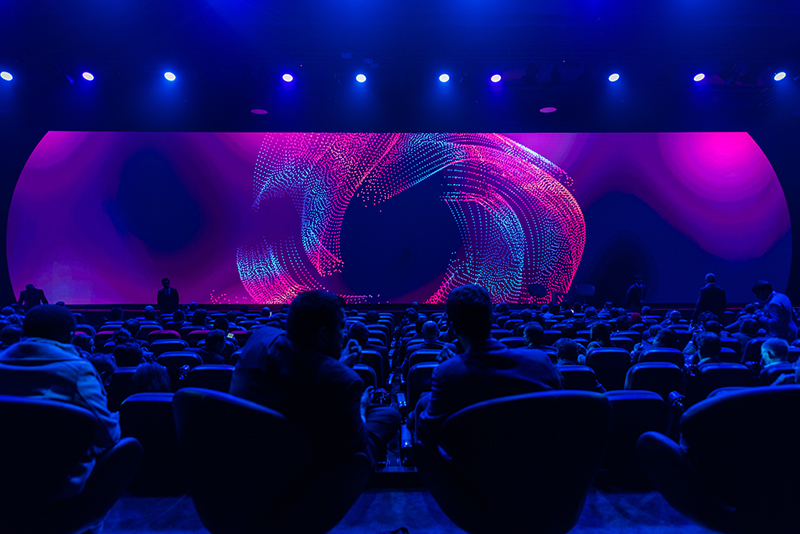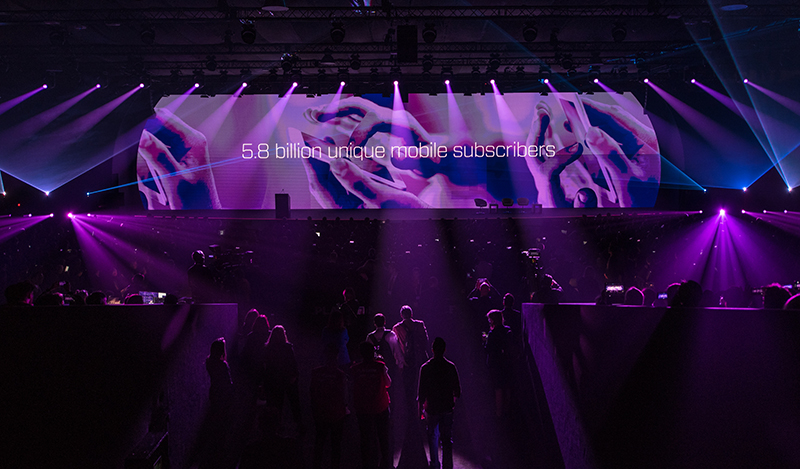
BARCELONA, Spain – Christie noted that its Spyder and Terra were deployed to control the visuals on a 98-foot-wide LED display at MWC (formerly Mobile World Congress) in Barcelona, Spain. MappScreen and Power AV teamed up to deliver impressive visuals for more than 100,000 attendees.
More details from Christie (www.christiedigital.com):

The Christie Spyder X80 multi-screen windowing processor and Christie Terra SDVoE technology solution brought to life a 98-foot wide by 21-foot high, 22 million pixel LED display at the largest mobile event in the world, MWC (formerly Mobile World Congress) Barcelona, recently. With content managed by MappScreen and Power AV, the 100,000 attendees learned the latest technologies, networked and participated in various panel discussions.
David Martínez, head of Power AV’s office in Barcelona, said, “Right from the very beginning, we knew that to run the content on a screen with these characteristics we needed input from a specialized partner. We immediately thought of MappScreen in Barcelona; which has a team with significant experience managing large format content for big events.”
“Our added value is the management of large-format contents on media servers, video processors and show control systems,” added Isaac Sancho, MappScreen partner. “There are very few companies here who know how to launch and fill multiple large-scale screens with content, and who have the hardware to do it. This is our strong point.”
When MappScreen agreed to take on the MWC 2019 project, it had just acquired the Spyder X80 video processor through Charmex − and put it to use almost immediately.
“The Spyder was the perfect choice for managing this screen,” said MappScreen’s Xavier Cruz Rubio. “It allowed us to work in 4K at 60Hz with maximum quality, and play videos on a huge scale completely synchronized up to an awesome processing power of 80 megapixels. With other systems, we would have had to use at least three units linked together in order not to lose resources when working everything in 4K. But with one single Spyder X80 you can do everything in 4K with no fuss, and that gives you great peace of mind.”
MappScreen used the Spyder X80 to manage all the signals going to the screen, including presentations, cameras, show control, and multi-windows. The Spyder, in conjunction with Octopus software, also synchronized the lighting and laser show in the hall that accompanied the images on the screen.
“The performance was really incredible,” Rubio explained. “It’s the best piece of hardware I know. It lets us do so many things; it almost seems omnipotent. In addition, the interface is very intuitive and easy to learn.”
David Martinez, from Power AV, agreed. “The X80 is a truly incredible machine, one of the best I know of in terms of management. It is very easy to use when launching events of this kind on top quality LED screens. And on an electronic level, it lets you operate with resolutions that other machines cannot handle.”
Christie Terra manages signal transmission with ease
To manage signal transmission, MappScreen used the Christie Terra AV-over-IP system, based on SDVoE (Software Defined Video over Ethernet) technology to switch, distribute, and extend signals of 4K video content. MappScreen also used Christie Terra Transmitter to extend audio, video, and control to deliver uncompressed, zero-frame latency, artifact-free content over 10G Ethernet networks. It also used Christie Terra Receiver to receive and decode data from the 10G Ethernet network, delivering it to displays and other AV devices.
“I have no problem in confessing that I am in love with Terra,” added Isaac Sancho Ferrer, CEO of MappScreen. “At the beginning we thought that it was simply extending 4K video signals, but then we realized that you can practically launch a whole event with it and that it operates like a separate matrix. It is really powerful and affords incredible versatility when it comes to delivering uncompromised signals. At this specific event we used it to extend various different kinds of signals over one single fiber cable.”


